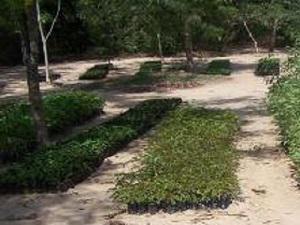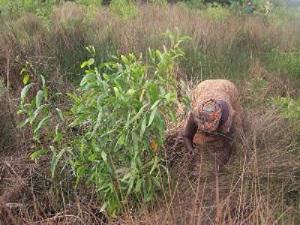Martin Ahorbo
This project aims to create awareness of the importance of mangrove resources among the communities and to restore degraded coastal mangrove forest along the Ele and Tetu creeks, near Adzato and its surrounding communities.

The Keta Lagoon Complex Ramsar Site is the largest wetland in Ghana managed by the Wildlife Division of the Forestry Commission of Ghana.

In Ghana, the full benefits associated with mangrove forests are not realized because mangroves are not managed as sustainable resources. Their importance has been limited to the level of subsistence - fuel-wood and poles for construction. Other natural benefits/services provided by mangroves have not been considered/harnessed to the full benefit of society at both local and national level. At the Keta lagoon Complex Ramsar Site, mangroves are harnessed for both subsistence and commercial uses at a rate that calls for action to sustain the resource. A preliminary study and research made by the applicant on “Human activity and sustainable management of mangroves in Ghana (A case study of Keta Lagoon Complex Ramsar Site)”, revealed that the local people are aware of the adverse impact from their action on the mangrove of the area – loss of major common fish and crab species, choked streams and creeks, and the general impact on their livelihoods.
This project seeks to create awareness among the target communities and contribute to restoring and conserving a degrading wetland ecosystem. In this regard, the project is expected to contribute to the overall objective of the Ghana National Wetlands Conservation and Action Plan (2007-2016) that seeks to promote wetlands conservation into the day-to-day activities of government, organizations, traditional authorities, communities and individuals within the broader context of environmental management. It is also expected to build the capacity and skills of local communities in keeping to a sense of ownership and proper management practices of their natural resources.
Adzato is one of the numerous communities in the Keta Lagoon Complex Ramsar Site whose livelihood is threatened by the mangrove/wetland degradation where this project will begin where the local community people will be trained and supported technically/materially to establish ecological friendly alternative sources of livelihoods and as these people become increasingly aware of the importance and also consistently derive benefits of conserving nature, with an improved socio-economic life and revenue for local development initiatives, their efforts to conserve the wetland ecosystem from which they derive livelihood will be in the long-term hence a long lasting contribution to nature conservation.
Major activities in this project are:
- Conduct public awareness creation to change mindsets, share experiences of good/safe practices and enhance knowledge;
- Raising and planting of mangroves and tree seedlings along the banks of creeks and other degraded wetland areas to improve the ecology of the area;
- Organize educational workshops, field visits to established community mangrove forests within some coastal Ramsar Sites which are intended to change the mindsets of the local community people;
- Practical and Participatory Field Training workshops/Hands-on demonstrations.